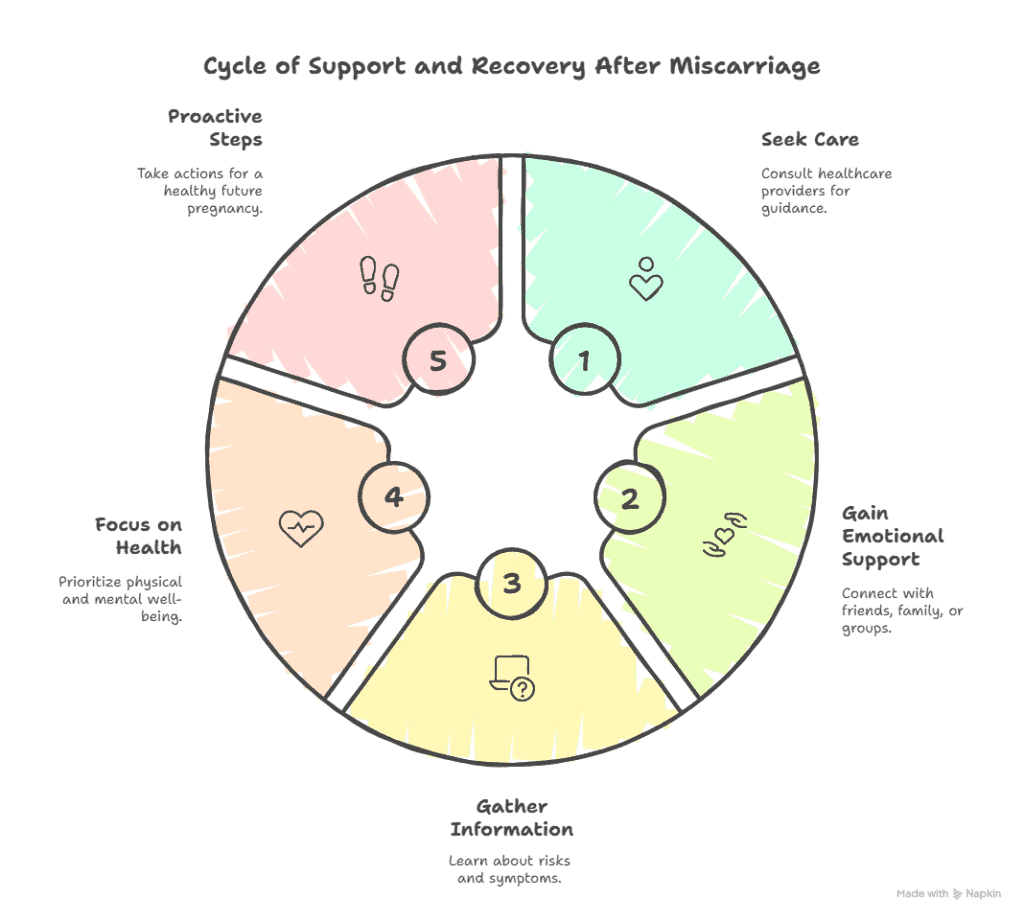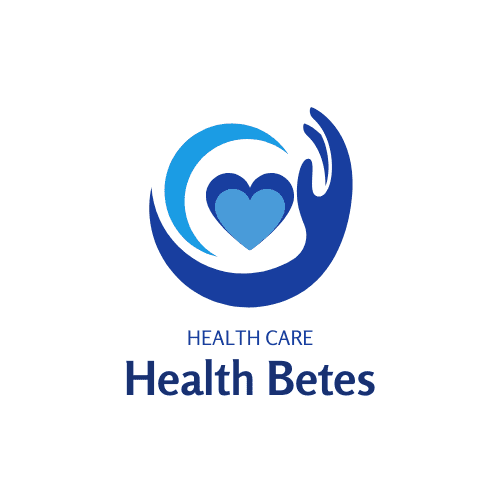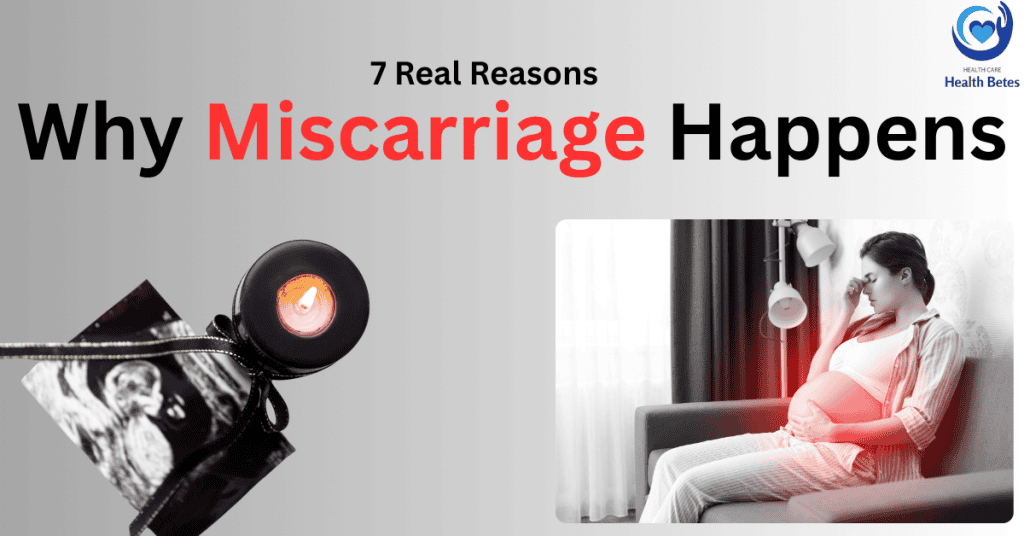Why Understanding the Reason of Miscarriage Matters
Let’s clear something up first: having a miscarriage doesn’t mean you did something wrong.
So many women blame themselves, thinking it was done because of her , a stressful day at work, or not getting enough sleep. But here’s the truth — most miscarriages happen for reasons completely out of your control.
Still, it’s natural to ask, “Why did it happen to me?”
That’s what this blog is here for.
We’re going to break down the real, often hidden reasons of miscarriage, especially in early pregnancy. You’ll get a clear idea of why miscarriage happens, what the medical experts say, and what you can actually do about it.
What Is a Miscarriage? (And Why It’s Not Your Fault)
Before we dive into the reasons, let’s quickly talk about what miscarriage actually is.
A miscarriage (also called early pregnancy loss) happens when a pregnancy ends on its own before the 20th week. But most miscarriages happen in the first trimester, usually before 12 weeks. This is why you’ll often hear the term first trimester miscarriage or miscarriage in early pregnancy.
Now, here’s something important:
Miscarriage is more common than people think.
According to health experts, about 10 to 20% of known pregnancies end in miscarriage. And that doesn’t even include the ones that happen so early, a woman might not even realize she was pregnant. These are sometimes called chemical pregnancies — where the pregnancy is lost shortly after a positive test.
So, if you’ve experienced one or more miscarriages, please know that you’re not alone.
Also, it’s not always easy to find a clear answer. In many cases, doctors can’t pinpoint the exact reason behind miscarriage, and that can be incredibly frustrating. The term unexplained miscarriage is sadly very real for many women.
But here’s the good news: understanding the common causes of pregnancy loss — even if they’re not always obvious — can help you feel more in control, and maybe even prevent future loss where possible.
How Common Is Miscarriage and Who’s at Risk?
Let’s i tell you another myth here:
Miscarriage doesn’t just happen to women with health problems or poor habits.
Many healthy women with perfect prenatal care still go through it. It doesn’t mean you’re too old, too stressed, or didn’t “try hard enough.” It can happen to any woman, no matter her age, background, or lifestyle.
That’s what makes it so confusing and emotional. But understanding how common it is might help you feel less alone.
So, how common is it?
Most studies show that about 1 in 5 pregnancies ends in miscarriage. And some experts believe the number is even higher when you count the very early losses — like those that happen before a woman even realizes she’s pregnant. These are called chemical pregnancies.
If you’ve had more than one miscarriage, you’re probably wondering, “Why do I keep having miscarriages?”
That’s a valid question. While one miscarriage is often just bad luck, recurrent miscarriage — meaning two or more in a row — might point to an underlying issue that needs medical attention.
So, who’s more at risk?
While miscarriage can happen to anyone, certain factors can increase the risk:
- Age – Women over 35 have a higher chance, and the risk keeps going up after 40.
- Previous miscarriages – Having one increases your chance of another.
- Chronic health conditions – Like diabetes, thyroid problems, and autoimmune diseases.
- Lifestyle habits – Smoking, heavy drinking, or drug use.
- Weight issues – Being underweight or overweight can affect hormone levels.
If you’re looking up terms like:
- most common reasons for first trimester miscarriage
- risk factors for early pregnancy loss
- why do miscarriages keep happening to me
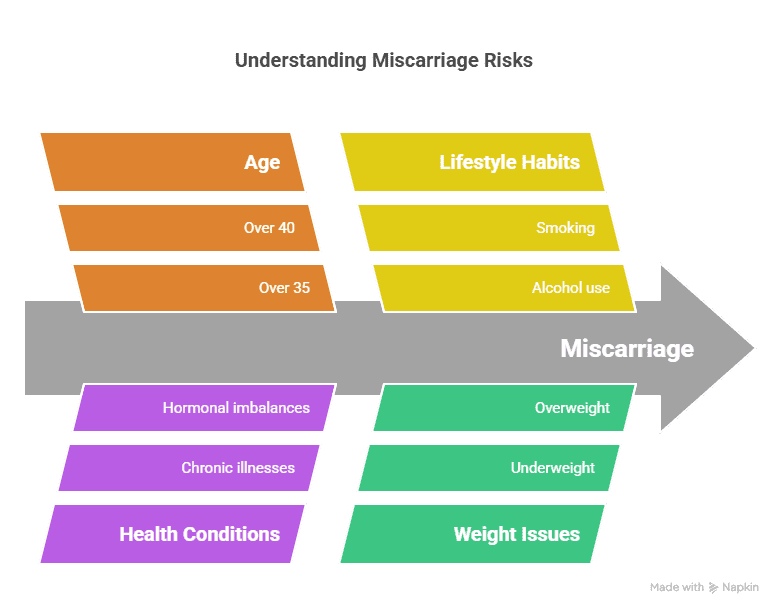
Top 7 Silent Reasons of Miscarriage You Should Know
Sometimes, miscarriage happens quietly — without clear symptoms or warnings. Below are seven lesser-known but very real reasons of miscarriage, especially in early pregnancy.
1 Genetic or Chromosomal Issues
This is one of the most common causes of miscarriage in the first trimester.
When sperm meets egg, your baby gets a mix of chromosomes. But sometimes, things go wrong during this process — there might be too many or too few chromosomes. This can cause problems in how the baby grows, and the body naturally ends the pregnancy.
Doctors call this a chromosomal abnormality. It’s usually just a chance and not something inherited. It also explains many miscarriages after a positive pregnancy test that seem to happen out of nowhere.
2 Hormonal Imbalances
Your hormones are the foundation of a healthy pregnancy. If they’re out of balance, it can affect everything from implantation to how the embryo grows.
One of the biggest Principal? Low progesterone.
This hormone helps prepare the uterus for pregnancy. If your body doesn’t make enough, the uterine lining may not support the baby, leading to early loss.
Also, thyroid issues and insulin resistance (especially in women with PCOS) can mess with hormone levels too.
3 Uterine or Cervical Problems
Sometimes, the issue is with the “home” where the baby is growing — the uterus or cervix.
If you have uterine fibroids, a misshaped uterus, or scar tissue, it can make it hard for the seed to attach properly or grow safely. These are often undiagnosed until after a miscarriage happens.
Then there’s the incompetent cervix — a condition where the cervix opens too early during pregnancy, usually without pain or contractions. This can lead to loss in the second trimester.
4 Infections and Immune Response
Certain infections can increase the chance of miscarriage. This includes:
- Urinary tract infections (UTIs)
- Sexually transmitted infections (STIs)
- Listeria from unpasteurized dairy or deli meat
- Toxoplasmosis (from raw meat or cat litter)
Your immune system can also react to the pregnancy as if it were a threat. In some women, their bodies create antibodies that attack the embryo, leading to loss.
This is often linked to autoimmune disorders like lupus or antiphospholipid syndrome.
5 Lifestyle and Habits
You’ve probably heard these before, but they do matter:
- Smoking can reduce oxygen flow to the baby
- Alcohol and drugs can interfere with fetal development
- Caffeine in large amounts may affect hormones or uterine blood flow
Also, a poor diet or too much processed food can increase inflammation and hormone imbalance.
If you’re wondering:
does caffeine cause miscarriage or which foods cause miscarriage in early pregnancy — yes, lifestyle plays a role. But moderation and smart choices are key, not panic.
6 Chronic Medical Conditions
Certain untreated medical problems can raise your risk of pregnancy loss:
- Uncontrolled diabetes
- Thyroid disorders
- High blood pressure
- Blood clotting disorders
If you’ve had more than one miscarriage, your doctor might test for these issues. Sometimes, low-dose aspirin or blood thinners are given in future pregnancies to help prevent miscarriage.
7 Stress and Emotional Factors
This is a tricky one. Normal stress — like being busy or worried — doesn’t usually cause a miscarriage.
But when you’re under a lot of emotional pressure, especially when mixed with other health problems, can have an impact. High cortisol levels may interfere with hormone balance, and in rare cases, intense stress could trigger uterine contractions.
So while stress alone won’t “cause” a miscarriage, it’s still important to manage it, for your mental and physical health.
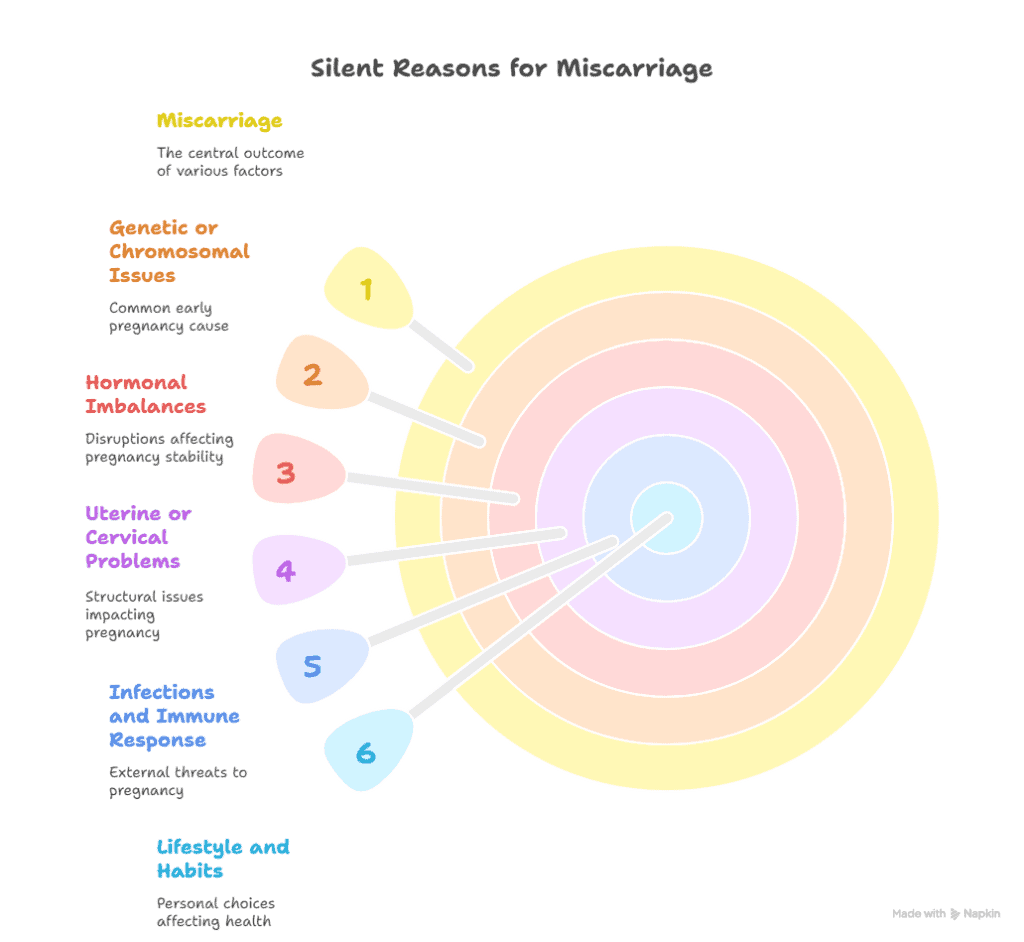
When Do Most Miscarriages Happen? (Timeline Breakdown)
Let’s discuss something that often confuses people: when do most miscarriages happen?
It’s common for women to wonder whether there’s a “safe” time in pregnancy. Unfortunately, there’s no magic number or time frame where you can be 100% sure everything will go smoothly. However, most miscarriages happen within the first 12 weeks, and many occur even earlier — before you even miss your period.
The 6-Week Mark
This is the first big milestone. Miscarriages at 6 weeks are pretty common, and many women don’t even realize they were pregnant at that point. This is why miscarriage at 6 weeks might not show up on a lot of pregnancy tests, and if it does, you might just think it’s a late period.
Why this happens?
It could be a chromosomal abnormality or something like a hormonal imbalance.
The 8-12 Week Period
If you get past the first 6 weeks and don’t experience any major signs of miscarriage, your odds of losing the pregnancy drop significantly. That’s why miscarriage at 8 weeks or between 8-12 weeks is still possible but less likely. At this stage, the baby has a heartbeat and has developed enough that it’s easier to spot on an ultrasound.
Most first trimester miscarriages happen during this time. However, it’s still a critical period, and the risk is higher for women who have chronic health conditions or have experienced pregnancy complications before.
What Happens After the 12-Week Mark?
Once you hit the 12-week mark, miscarriage risk significantly drops. By now, the pregnancy is considered more stable, and second trimester losses are less common but still possible. Women who miscarry later than 12 weeks may be dealing with issues like cervical incompetence, chronic health problems, or infection.
Signs and Symptoms of a Miscarriage
Knowing the early signs of a miscarriage can be tricky — especially because some of the symptoms are similar to early pregnancy signs.
But understanding what to look for can help you take action and seek medical advice when needed. Here’s what to be aware of:
1. Bleeding or Spotting
A small amount of spotting or light bleeding during pregnancy can happen in early stages, and it doesn’t always mean miscarriage. However, heavy bleeding, especially if it’s accompanied by cramping or clotting, is a warning sign.
If you experience bleeding, make sure to contact your doctor, even if the bleeding isn’t heavy. They’ll check the situation through an ultrasound or other tests.
2. Cramping and Abdominal Pain
Mild cramping can be a normal part of pregnancy, but if you experience severe cramping or sharp pain in the abdomen, it could be a sign of miscarriage.
Pain typically happens in the lower abdomen or back and can get worse over time. This may be accompanied by heavy bleeding, which could indicate that the pregnancy is ending.
3. Loss of Pregnancy Symptoms
Early pregnancy symptoms like morning sickness, sore breasts, and fatigue might suddenly go away. A sudden loss of pregnancy symptoms could be a sign that the pregnancy isn’t progressing.
While many women experience a reduction in symptoms as they move into the second trimester, a sudden loss of all early pregnancy signs could be a red flag.
4. Passing Tissue or Clots
If you start to pass tissue or blood clots, it’s a definite sign that a miscarriage is happening. Sometimes, this tissue can look like a gel-like substance and might come with the bleeding.
In this case, it’s critical to go to the doctor to ensure the miscarriage is complete and there are no complications, such as retained tissue.
5. No Heartbeat on Ultrasound
If a pregnancy test shows positive and ultrasound doesn’t reveal a heartbeat after the 6-week mark, it could indicate that the pregnancy has ended. Many times, this happens with blighted ovums (when an embryo doesn’t develop) or chromosomal issues.
When Should You Contact a Doctor?
- If you experience any heavy bleeding or cramping
- If you pass tissue or blood clots
- If your pregnancy symptoms suddenly disappear
- If you feel sharp, intense pain
- If you have concerns about your symptoms at any stage of pregnancy
Miscarriage is an incredibly personal experience, and it can be very hard to navigate emotionally and physically. But knowing the signs and seeking medical advice can make a huge difference in your care and understanding of your body.
How to Prevent Miscarriage Naturally (What You Can Do to Support a Healthy Pregnancy)
While there’s no guaranteed way to prevent a miscarriage, there are certainly things you can do to optimize your chances for a healthy pregnancy. This is all about taking care of your body, managing stress, and making sure you’re in the best shape possible for both you and your baby.
1 Maintain a Healthy Lifestyle
The first and most important step? Taking care of your body.
You already know that smoking, drinking, and heavy caffeine intake aren’t good for your pregnancy — but maintaining a healthy diet and regular exercise are key too.
- Eat a balanced diet rich in fruits, vegetables, whole grains, and lean proteins. This will help keep your hormones balanced and support your baby’s growth.
- Prenatal vitamins are a must. Specifically, folic acid helps prevent neural tube defects and supports overall pregnancy health.
- Exercise regularly but don’t overdo it. Gentle, low-impact activities like walking or swimming are great for your circulation, mood, and general well-being.
2 Manage Stress Effectively
Excessive stress might not directly cause miscarriage, but it can take a toll on your body. Stress messes with your hormones, which can affect everything from implantation to blood flow to the uterus. Long-term stress might even lead to a higher risk of conditions like gestational hypertension or diabetes — both of which increase the risk of miscarriage.
Some ways to reduce stress:
- Mindfulness techniques like meditation and deep breathing can calm your nervous system.
- Gentle yoga can help keep your body in balance and improve flexibility.
- Get enough sleep each night to allow your body to recharge.
Managing stress is a powerful way to support your health and pregnancy. So if you’re worried about can stress cause miscarriage, managing it can only help.
3 Take Care of Your Reproductive Health
Regular checkups with your doctor are essential. Make sure to:
- Screen for STIs if needed. Untreated infections like chlamydia or gonorrhea can increase the risk of miscarriage.
- Get regular Pap smears and other tests to ensure there are no underlying reproductive issues that could affect your pregnancy, such as cervical insufficiency or fibroids.
If you’re trying to conceive or have had a previous miscarriage, talk to your doctor about any pre-existing health conditions (like diabetes, thyroid issues, or blood disorders) that could affect your pregnancy.
4 Avoid Toxins and Chemicals
Being mindful of your environment is key to reducing your miscarriage risk. This includes:
- Avoiding pesticides and certain cleaning chemicals that can disrupt your hormone levels.
- Choosing natural personal care products (like lotions and shampoos) that are free from harmful chemicals like parabens and phthalates.
- Reducing exposure to environmental toxins (such as second-hand smoke, chemicals in the workplace, or air pollution).

When to See a Doctor About Miscarriage Concerns
While the idea of a miscarriage is heartbreaking, you can gain peace of mind by knowing when to reach out to your doctor. Here are a few key times when you should absolutely call your healthcare provider:
1 Early Signs of Miscarriage
If you notice any of the following symptoms in your first trimester, call your doctor immediately:
- Heavy bleeding or clotting
- Severe cramping or back pain
- Sudden loss of pregnancy symptoms (like morning sickness or sore breasts)
- Passing tissue or blood clots
These symptoms don’t always mean miscarriage, but your doctor can check things out and provide guidance on what to do next.
2 If You’ve Had Multiple Miscarriages
If you’ve had two or more miscarriages, talk to your doctor about potential underlying causes. Sometimes, issues like hormonal imbalances, genetic problems, or uterine abnormalities could be factors. Early testing can help guide treatment and increase the chances of a successful pregnancy in the future.
3 After the First Trimester
If you experience any of the following after 12 weeks, it’s time to get in touch with your healthcare provider:
- Severe abdominal pain that doesn’t go away
- Heavy bleeding or spotting
- Loss of fetal movement (if you’re further along in your pregnancy)
In some cases, these symptoms can be a sign of a second-trimester miscarriage, preterm labor, or another issue that needs prompt attention.
4 Preconception Care
If you’re planning to get pregnant or are struggling to conceive, don’t wait for the issue to arise. Speak with your doctor about preconception care and any lifestyle or health changes you might need to make. They can help you get on the right track before conception and minimize your risk of miscarriage from the start.
Conclusion: Understanding and Navigating Miscarriage
Miscarriage is an emotionally and physically challenging experience, and understanding its causes, symptoms, and prevention methods can help women feel more informed and empowered. While we can’t guarantee that miscarriage can always be prevented, taking care of your health, managing stress, and having the right support systems in place can make a significant difference.
If you’re worried about miscarriage or have experienced it in the past, remember that you’re not alone. Many women go on to have successful pregnancies after a miscarriage. Consulting with a healthcare provider, staying informed, and taking steps toward a healthy lifestyle can greatly enhance your chances of carrying a pregnancy to term.
If you’ve had concerns like:
- Why did I have a miscarriage?
- What are the signs that a miscarriage is happening?
- How can I prevent a miscarriage naturally?
This blog should provide the clarity and understanding you need.
It’s important to remember that miscarriage isn’t always preventable. Sometimes, it’s simply a part of life and the process of conception. However, by prioritizing your health and being aware of the early signs and risks, you can give yourself the best possible chance at a healthy pregnancy in the future.
AQs (Frequently Asked Questions)
Q1: Can a miscarriage happen without bleeding?
Yes, a miscarriage can happen without heavy bleeding, especially in early pregnancy. Sometimes, it can happen with minimal symptoms or only spotting. However, severe cramping or tissue passing are usually signs that something is wrong.
Q2: Can stress cause a miscarriage?
While stress alone isn’t directly linked to miscarriage, long-term high stress can affect your overall health, leading to complications like high blood pressure or diabetes, which can increase the risk of pregnancy loss. Managing stress through relaxation techniques can help reduce any potential risks.
Q3: What are the first signs of miscarriage at 6 weeks?
At 6 weeks, common signs include light bleeding or spotting, mild cramping, or the sudden loss of pregnancy symptoms like nausea or fatigue. If any of these symptoms occur, it’s important to consult a healthcare provider right away.
Q4: How can I reduce my risk of miscarriage?
Maintaining a healthy lifestyle with balanced nutrition, regular light exercise, managing stress, and avoiding smoking, alcohol, or harmful chemicals can all help support a healthy pregnancy. Also, make sure to keep up with regular prenatal visits to monitor your health and pregnancy progress.
Q5: Can a miscarriage be prevented naturally?
While not all miscarriages are preventable, maintaining a healthy lifestyle, taking prenatal vitamins, managing stress, and getting enough rest can increase the chances of a successful pregnancy. It’s important to avoid any potential toxins and consult with your doctor if you have any underlying health concerns.
Q6: Is a miscarriage common in early pregnancy?
Yes, miscarriages in early pregnancy are more common than many realize. 1 in 4 pregnancies end in miscarriage, and most occur in the first 12 weeks. Many women don’t even realize they were pregnant or think it’s just a late period.
Q7: How long does it take to recover from a miscarriage?
Physical recovery from a miscarriage can take anywhere from a few weeks to a few months, depending on the individual. Emotional recovery might take longer, and seeking support from loved ones or a therapist can help with coping.
Q8: Can I still have a healthy pregnancy after a miscarriage?
Yes! Most women who experience a miscarriage can go on to have healthy pregnancies in the future. It’s important to give yourself time to heal physically and emotionally and to seek medical advice if you’ve had multiple losses.
Final Thoughts
Miscarriage can feel isolating and overwhelming, but remember that you’re not alone in this. Whether you’re going through it now or have been through it in the past, seeking the right care, emotional support, and information can make a big difference in navigating these difficult times. By focusing on your health and understanding the risks and symptoms, you can take proactive steps toward a healthy pregnancy in the future.
If you’re ready to try again or have concerns about miscarriage, don’t hesitate to reach out to a healthcare provider for guidance and support.
